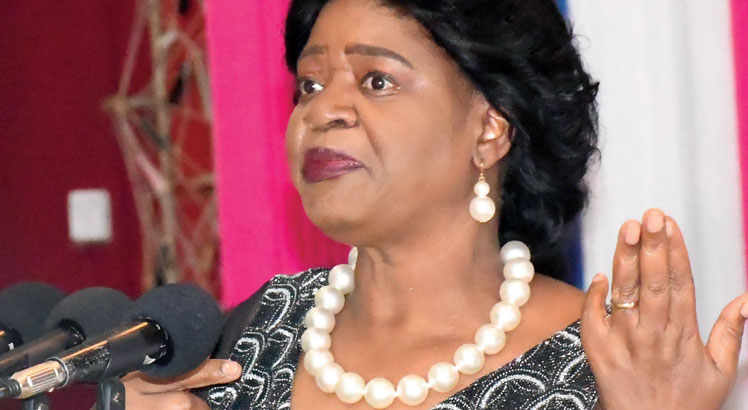Monica Chakwera: the first lady of Malawi
From a modest background in Rumphi, the life of Malawi’s First Lady Monica Chakwera turned around owing largely to education.
It rescued her from the jaws of poverty, according to a recently released documentary of her life story produced by Plan International Malawi (PIM).
Today, the mother of four children encourages girls, especially those from the rural areas, to put education first and change their life stories.
Born on September 30 1953, she grew up in a rural setting at Jeka Village in Mwazisi, Traditional Authority (T/A) Chikulamayembe, Rumphi.
Chakwera was a third born from eight children, but unfortunately one of their siblings passed on when they were young.
Today, the First Lady says her life as it turned out, can largely be attributed to her mother, whose zeal to get them all educated was unparalleled.

She explains: “My mother worked hard to pay school fees for me and my siblings, both for primary and secondary education. In our time, we paid fees for both primary and secondary school education.”
Her early years of school began at Mwazisi Primary School. They walked 10 kilometres to and fro school, recalling that when it rained, they would get soaked and dry naturally.
“We did not know about umbrellas then. When you are poor, you do not even realise you are poor because that is the only life you know,” she explains.
Living close to Nyika Plateau in Rumphi, one of the coldest areas in winter, she says they still walked to school without shoes or a sweater as their parents could not afford.
They warmed themselves in roadside fires on their way to school.
“Older children used to light fires on the wayside and as we went to school, we would stop to warm ourselves a little and proceed until we reached school,” Chakwera explains.
But through hard work and with inspiration from her older brother who was then selected to college, she was selected to Likuni Girls Secondary School.
She left home for the first time to travel about 450 kilometres to Lilongwe.
Chakwera was selected to secondary school alongside one of her brothers who re-sat the Primary School Leaving Certificate of Education (PSLCE).
But with the financial hardships, her family could not afford to send both to secondary school at the same time.
Fearing that she might end up getting married if she waited another year, her mother decided Chakwera went while her brother waited.
She was surprised and excited to find that the school diet was better than the one at home.
The First Lady enjoyed being in school for the many other exciting things that boarding school life brought.
However, as the fees problems persisted in forms one and two, she was ‘lucky’ that by this time, her older brother had been selected to Chancellor College.
He sacrificed his allowances for her and her siblings’ fees. In forms three and four, her fees were paid by Save the Children.
Still, there were times when there was no money for transport to go home for holidays when schools closed.
In such times, Chakwera stayed behind, doing piecework for Roman Catholic Church sisters to raise some pocket money.
It was the same piecework that helped her earn money for her secondary school graduation attire later on.
In terms of schoolwork, she was one of the few students who were good at Mathematics in her class.
She was selected to the University of Malawi’s Polytechnic, now Malawi University of Business and Applied Sciences (Mubas).
“University life was even more exciting. In those days, as long as you went to college, you were done with poverty because we also used to receive allowances then,” she explains.
Upon completing her studies at Poly, she had a job already lined up at the Imports and Exports Company.
Two years into her job, she got married to President Lazarus Chakwera in 1977.
He had already received his calling as a pastor at the time and she later accompanied him to South Africa to pursue his theological studies.
While there, she took the opportunity to upgrade her studies and studied Bachelor of Arts in social work.
Chakwera eventually became a chartered accountant and now encourages girls to stay in school and remain focused.
PIM has since launched a booklet and documentary of the First Lady’s life story.
Speaking during the launch, country director Phoebe Kasoga said the book will help demonstrate to younger girls in rural areas that one can be in the village and yet, tomorrow sit with kings and queens.
She said: “Your situation today does not determine your future. We believe there are many stories like this, but are never told. While we struggle with similar challenges and think the world has crushed on us, there is somebody that has gone before us and listening to their stories will give us inspiration.”
Similarly, Minister of Education Agnes Nyalonje said there are lessons to be drawn from the First Lady’s life story, including special lessons in humility, focus, determination, resilience and reliance on God.
“This is a story that connects the girl child to her dream. It is a story that speaks of possibilities regardless of where one comes from or their economic status,” she says.
Nyalonje adds that her ministry has prioritised girls’ education because of the hurdles they face to access schooling, persist in school, perform and complete various levels of education.





